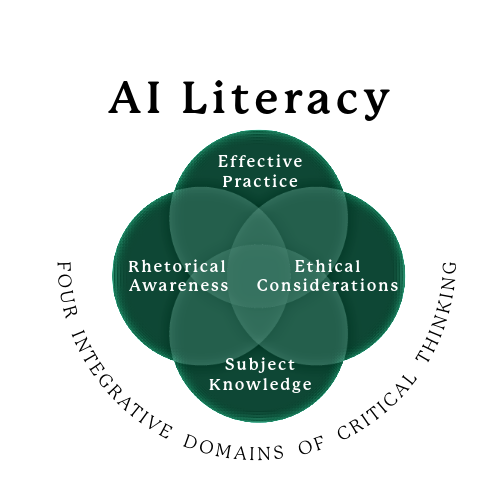
A framework for considering AI literacy

Ohio University’s Center for Teaching, Learning, and Assessment (CTLA) Faculty Fellow Paul Shovlin and colleagues have established a literacy framework for artificial intelligence (AI) arising from the center's dynamic position statement on generative AI in teaching and learning. This framework is designed to assist OHIO faculty and students as they build literacy.
AI literacy consists of at least four integrative domains of critical thinking. These are not discrete components that can be taught well independently but often co-exist and co-inform one another. They are equally important.
- Effective practices address how to engineer prompts, select particular AI applications and understand the affordances and limitations of different platforms, among other approaches.
- Ethical considerations are both narrow (for example those related to privacy or security) and broad (for example, larger ethical concerns, such as inherent biases embedded in programming or training, exploitation of human trainers of LLMs and power consumption of servers).
- Rhetorical awareness is an understanding of audience expectations and how GenAI use may be effective or counterproductive to the success of communication.
- Subject matter knowledge in that sufficient knowledge of the subject matter is required to review, query and transform AI products.
AI literacy is a mix of the theoretical or conceptual with application and practice learning
AI literacy includes both writing and reading skills. This means writing and reading skills are a necessary precursor to AI literacy and, also, AI literacy requires a distinct kind of writing and reading.
Healthy AI literacy initiatives must have a place for those cautious of, skeptic of, and even resistant to the technology. This means that AI literacy for a proponent may look different than AI literacy for the more cautious. Both, however, will advance literacy and application through an exchange of perspectives and research. Individual agency should be respected through options for literacy development.
For more information, see the CTLA website.
